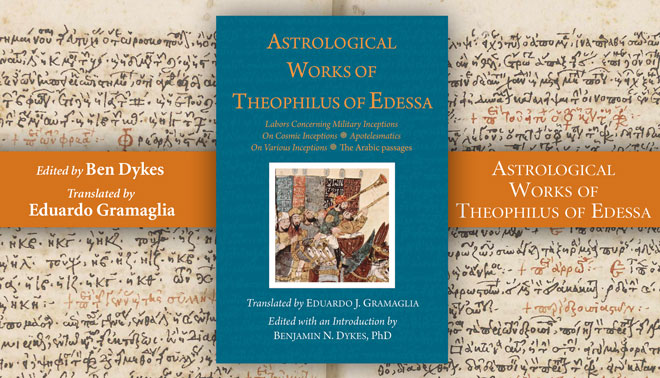
In episode 120 of the podcast Benjamin Dykes and Eduardo Gramaglia join the show to talk about their new translation of the astrological works of the 8th century astrologer Theophilus of Edessa.
Theophilus was a Christian astrologer who served the kings of the early Islamic Empire around the time of the pivotal transition between the Umayyad and Abbasid Caliphate.
He was an older contemporary of other notable astrologers who lived during the early Medieval tradition like Masha’allah, although he is unique in that his surviving works were written in Greek rather than Arabic.
He also drew on a number of earlier Greek sources such as Dorotheus of Sidon. As a result of this, Theophilus is an important transitional figure between the Hellenistic and Medieval astrological traditions.
The new translation by Ben and Eduardo marks the first time that Theophilus’ astrological works have been fully translated into any modern language, and in this interview we talk about who Theophilus was, the process of doing the translation, and the significance of his work.
The translation is now available for purchase on Amazon:
Astrological Works of Theophilus of Edessa
Below you will find the show notes with an outline of some of the points we touched on in the discussion, followed by links to download or stream the recording of this episode of the podcast at the bottom of the page.
Show Notes
- The book is titled Astrological Works of Theophilus of Edessa.
- Published in May of 2017.
- Since it is his first time on the show, we introduce Eduardo and talk about his background.
- This is Ben and Eduardo’s second collaboration together, after their 2013 translation of book 3 of Hephaistio of Thebes.
- Who was Theophilus of Edessa?
- A Christian astrologer from ancient city of Edessa, which is located in what is now south-eastern Turkey in modern times, near the border with Syria.
- Lived 695–785 CE.
- What is significant about his work?
- Lived during a transitional period between Hellenistic and Medieval traditions
- Is one of the earliest notable Christian astrologers.
- Was court astrologer to early Islamic Caliphs during the late ‘Umayyad and early ‘Abbasid period
- Wrote some of the earliest works on military and horary astrology.
- What are the texts translated in this volume?
- Labors Concerning Military Inceptions
- Collection on Cosmic Inceptions
- Apotelesmatics
- On Various Inceptions
- What was the process of preparing this translation like?
- Some of the material was edited in the CCAG.
- Much of the text had to be translated from manuscripts
- Some material was referenced from David Pingree’s personal papers
- Theophilus’ work on mundane astrology
- He lists four methods for doing mundane predictions from the tradition
- The fourth is the Persian method of using Aries ingress charts
- He says that he only learned this later in his career
- Horary astrology
- Another important aspect of Theophilus is the prevalence of horary astrology.
- He is one of the first authors writing in Greek who talks about it extensively
- What is strange though is his approach still looks very much like the earlier Hellenistic electional tradition
- He is often converting electional rules from Dorotheus to horary questions
- Often just focuses on using the four angular houses, rather than profections between specific house rulers.
- Previous discussion about earlier traces of horary in Dorotheus and Hephaistio.
- Christianity in Theophilus
- He was a Chalcedonian Christian.
- At the beginning of one of the texts he spends a lot of time talking about and defending astrology within the context of Christianity.
- Theophilus talks about Genesis and the seven day week, and the associations with each of the planets.
- Theophilus then is one of the first major/notable Christian astrologers we know of in history.
- Theophilus as court astrologer
- Ben says that “One did not do this for the romance of travel. Caliphs did not want to hear about the evolution of their consciousness.”
- He was involved in doing some pretty serious military astrology.
- He was present at some pretty notable battles.
- Saturn as Feminine revisited
- Previous discussion about Saturn as feminine
- Theophilus is the main later astrologer who continues the tradition of treating Saturn as feminine that we see in the Arabic version of Dorotheus.
- Theophilus was probably influenced by Dorotheus in this, as Dorotheus is really his main source for much of his work.
- The question is whether he had access to something like the original Greek text, and thus this confirms that Saturn was actually listed as feminine there by Dorotheus originally, or whether T was drawing on the Persian translation, where this could have been an error in the text.
- Not clear if this question can be resolved.
Transcript
A full transcript of this episode is available: Episode 120 transcript
Listen to This Episode
You can either play this episode of the podcast directly from the website or download it as an MP3 to your computer by using the buttons below:
Podcast: Play in new window | Download (Duration: 1:59:12 — 54.9MB)
